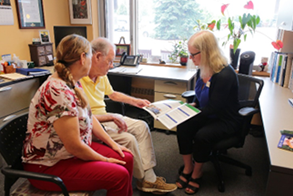
Navigating Health Care Appointments

An important part of staying healthy involves occasionally going to appointments with your health care provider. Ensuring you make the most out of these appointments to share and receive the information you need is imperative. Here are a few tips to help you prepare for and get the most out of these experiences:
- Know what your loved one’s best time of the day is and try to organize the visit at that time
- Keep a “Care Partner’s journal” – make note of changes in behaviours or abilities, including sleeping, eating and activity levels, to share with your health care provider
- Be prepared to take notes
- Put together a list of medications, including over-the-counter medications and supplements
- If possible, always include your loved one in the conversation, as it is important that they are a part of their care planning. Keep in mind that it’s all too easy to inadvertently talk about your loved one during a visit rather than having conversations with everyone included
- If your loved one lacks insight and gets agitated or argumentative with these discussions, arrange to speak with the health care representative individually or ask them to phone you back after the visit when you can speak more candidly
- Don’t be afraid to say what you need – for example, ask about help with your loved one’s sleep, so that you get enough rest as well
- Ask about respite options – remember that it is not a weakness to ask for respite time. It is a good choice to take care of yourself first so that you can in turn provide care to your loved one
- Share information from these visits with your “circle of care” to ensure that everyone is up-to-date
- Be prepared at any stage of the dementia journey to discuss future planning, such as long- term care possibilities, short stay respite care, community supports, safety planning and emergency support options, should something unexpected happen to you (e.g., illness, hospitalization)
- If possible, have a family member or friend accompany you for emotional support
It is important to remember that the better prepared you are for these visits, the more the health care practitioner will be able to help. Asking questions, sharing information and learning about coping strategies are essential to ensuring that you and your loved one receive the care you need when you need it.